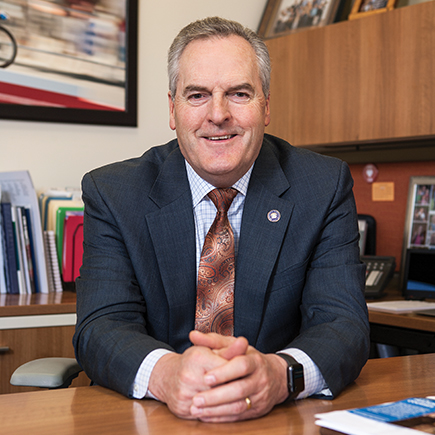Referencing a time-honored tradition in academia, GOED’s Executive Director, Val Hale, delivered his ‘last lecture.’ Hale’s last day at GOED is Jan. 8, 2021, and then he and his wife Nancy will serve a mission for The Church of Jesus Christ of Latter-day Saints in Los Angeles.

“It was my privilege to share important life lessons learned over a 40-year career with my GOED family,” Hale said. “Each of you has a special place in my heart, and I will miss you all dearly, but I look forward to mine and Nancy’s next adventures and hope we can be of service to others.”
Hale has left an everlasting mark during his six-and-a-half years at GOED. The team expressed thanks for his leadership, sharing observations that they will miss Hale’s ever-guiding presence, leadership by example, and most of all, his kind, compassionate spirit.
The 10 life lessons Hale shared include:
10. Maintain a personal touch in our high-tech world.
We live in a world dominated by technology, and in some ways, life is better today because of technology, but in other ways, important ways, it’s worse. Those who choose to show a personal touch in this day and age will stand out and be successful. Technology is all around us, but don’t let it dominate your life and deny you the joy of interpersonal relationships.
9. Emails are good; handwritten notes are better.
There is nothing wrong with sending someone an email, but send a handwritten note if you really want to make a statement. I once wrote a letter to a small business owner who I had never met. A few days later, I got a letter from her. This is what it said:
Dear Mr. Hale,
“Thank you so much for your kind letter of recognition. It was so nice to open up such a pleasant letter on a stressful day. What a surprise! What a wonderful thing it would be if we all followed your example. It reaffirmed for me the idea that small things really can make big differences. Thank you for being a great example to me.”
8. Make the effort to genuinely listen.
Learn to listen intently to others and engage in conversation. They will love you if you truly listen. Someone at a conference I attended once told us to look at the color of the person’s eyes when they are talking to you. I’m not very good at this, and I wish I were better.
7. Spend some time each day in quiet contemplation.
We live in a world where thousands of people and entities compete for our attention each day. Taking just five minutes of your day for yourself to commune with your mind and soul will do wonders for your mental health. A little meditation and contemplation will clear your mind and allow in that spark of inspiration that so often changes your life.
6. When you have the chance to give a compliment, do it!
When was the last time you received a compliment from someone? How did you feel? Now the tough question, how many compliments did you hand out yesterday? If you have a chance to give a sincere compliment, don’t waste it. Harriet Beecher Stowe famously said, “The bitterest tears shed over graves are for words left unsaid and deeds left undone.”
5. Choose to be happy.
Don’t allow yourself to enter an attitude from which recovery is impossible. Look on the bright side of things and make a conscious choice to be happy. Don’t take on a victim mentality. People want to be around happy, positive people.
4. Be ever learning.
You have heard me say that “earners are learners, and learners are earners” and “readers are leaders and leaders are readers.” Learning is a journey, not a destination. Once you get your degree, your learning shouldn’t stop. Keep reading, keep searching and keep expanding your mind.
3. Live life with passion.
Life is short, and I am on life’s back nine, but I hope to have many adventures left in me. That’s why Nancy and I are starting this next chapter as missionaries in Los Angeles. Oh, the amazing places we’ll go and the people we’ll meet. Someone once said, “Stop pacing the aisles and counting the miles. Instead, climb more mountains, eat more ice cream, go barefoot more often, swim more rivers, watch more sunsets, laugh more, cry less. Life must be lived as we go along.”
2. Live the racquetball rule.
For about a decade, I played racquetball almost every day. In that sport, as in life, you only score points when you serve. The best way to make a positive difference in the world is by serving others. My wife, Nancy, is a great example of someone who makes a difference by serving others. She has helped neighborhood children and adults struggling with math; she teaches free piano lessons to children in the neighborhood whose families can’t afford them, and these are just a few examples. My wife taught me that you are never too busy to serve others. I challenge you to look around and see how you can make the world a better place by serving others.
1. Relationships matter most.
As I look back over 40 years, several faces and names stand out in my mind. I will be forever grateful for those people who took an interest in me and befriended me. I knew I would never be the smartest person in the room, so I decided to try to be the kindest and the friendliest. Don’t ever miss an opportunity to develop meaningful relationships. Most importantly, be sure to nurture your most important relationships and don’t let work and life get in the way of your relationships with your family and friends. At the end of the day, relationships are all we have.
